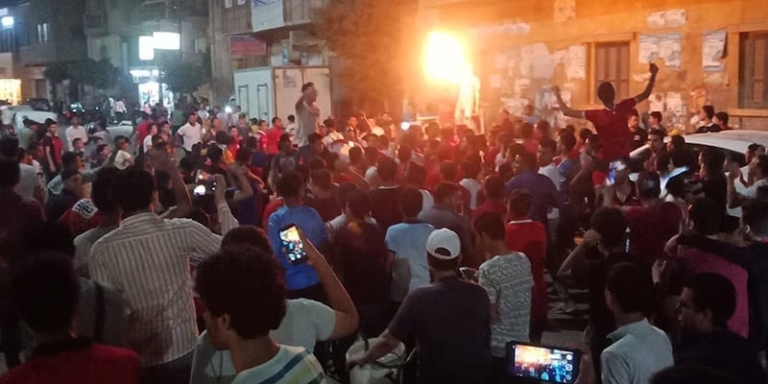
What little is known about the demonstrations that broke out in Egyptian cities since Friday, September 20, is that they are spontaneous and the protesters are demanding the departure of President Abdel-Fattah el-Sisi and his coterie of stalwart supporters. The trigger for these protests appears to be a former businessman-contractor and actor, Mohammed Ali, who knows the inner workings of the Egyptian state. Ali has incriminating evidence against Sisi, his family, and military advisors. In addition, he has been releasing videos revealing malfeasance and corruption in military and other contracts, urging people to stage mass protests to topple the president.
From his perch in self-imposed exile in Spain, Ali sounds like a knowledgeable boon to government critics: he is someone who has abandoned relations with the gilded class of Egypt’s crony capitalism to assume the role of whistleblower, one who exposes where funds have disappeared as millions of Egyptians join the ranks of the country’s poor every day. His reports and videos have painted a picture of outright corruption and kleptocracy, from the president on down to his immediate advisors. Even army officers have benefited financially from state-funded projects in addition to the many privileges that they enjoy from outside contracts and other state employment opportunities.
But the demonstrations taking place today are unlike those that animated Egypt’s short experiment with agitation for change at the beginning of 2011. A combination of the timing of the protests, the identity of the messenger calling for them, and state repression have produced lackluster participation. The millions of youth activists who thronged public squares in 2011 to demand the end of the regime of former President Hosni Mubarak have not yet materialized. Those marching today and chanting cherished slogans about regime change do not appear to have the widespread, round-the-clock media coverage that made Tahrir, Maspero, Cairo, Alexandria, Suez, and other locales common names that signify protest around the globe. Save for calls by a rights organization about safeguarding Egyptians’ right to freely voice their opinions, world governments do not seem to be paying much attention and, so far, have not expressed much apprehension about what normally should be seen as instability in Egypt.
Aside from cordoning off symbolic gathering places like Tahrir Square in Cairo, ordering police to attack protesters with tear gas, and carrying out arbitrary arrests, the state itself does not look very concerned. To be sure, the protests are being handled as if they are riots egged on by Muslim Brotherhood agitators. Pro-regime media are already on cue. President Sisi himself is in New York to attend the 74th annual United Nations meeting, ostensibly to show that the protests are insignificant and do not threaten the regime and partly to appear that he is in command—especially in front of other world leaders, most significantly President Donald Trump. Sisi did consider canceling his trip to New York, only to decide later that it was necessary.
Coming to office in 2013 after toppling the duly elected president, Mohamed Morsi, Sisi must have thought that a coup could be staged against him while he was outside the country. But he really did not have to consider that possibility. In 2011, the Egyptian armed forces did not rise against Mubarak even while millions of Egyptians were out on the streets. The Supreme Council of the Armed Forces merely told the former president that it was time for him to step down, not only because demonstrators insisted on his departure but also because Egypt’s international friends, especially the United States, decided to withdraw their support. Egypt’s military today is reluctant to pull its support from the man who toppled a president from the Muslim Brotherhood; indeed, the institution does not see the need for doing so with only thousands of demonstrators on the streets. Besides, who among his top commanders––or even lower-ranked, disaffected officers––wants to take on the responsibility of running a country with a broken economy and diminished international prestige?
Yet, no one can escape––or ignore––the unmistakable message that Egyptians are sending: that their Arab Spring is not over and that they remain committed to the ideals that sent them to the streets eight years ago. Yes, since Egypt’s democratic experiment was cut short in 2013, thousands have been jailed, tortured, disappeared, and even killed in the state’s reversion to repression; and unfortunately, many of today’s protesters will likely join their compatriots’ ranks. But those who continue to believe in change and others who have decided to resist repression seem determined to keep the January 25, 2011 revolution alive. As in those heady days, the hope remains that Egypt will be able to chart a democratic way forward, away from the security state that has stifled dissent and freedoms in the name of development. The protesters are calling world attention to a government whose funds are cynically and continually siphoned off by the country’s military establishment and its privileged brass.

